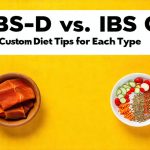Irritable Bowel Syndrome (IBS) is a chronic gastrointestinal disorder affecting millions worldwide. Characterized by abdominal pain, bloating, gas, diarrhea, and constipation – often in varying combinations – IBS can significantly impact quality of life. Managing this condition often involves dietary modifications, as food sensitivities play a substantial role in triggering symptoms for many individuals. One common question amongst those with IBS is whether or not fruit should be avoided altogether. This isn’t a simple yes or no answer; the relationship between IBS and fruit is complex, depending heavily on the type of fruit, individual tolerance levels, and the specific subtype of IBS a person experiences. Understanding these nuances is crucial for creating a sustainable and comfortable dietary plan.
The misconception that all fruits are problematic stems from their natural sugar content – specifically fructose – and fiber levels. While many people tolerate fruit without issue, others find it exacerbates their symptoms. It’s important to remember that IBS isn’t one size fits all. What triggers symptoms in one person may not affect another. A blanket avoidance of fruit can lead to unnecessary dietary restrictions and potential nutrient deficiencies. Therefore, a more nuanced approach focusing on identifying individual sensitivities and making informed choices is generally recommended. The goal isn’t necessarily elimination, but rather strategic inclusion based on personal experience and guidance from healthcare professionals. If you’re unsure about certain foods, exploring 5 foods to avoid may be a good starting point.
Understanding the Role of Fructose & FODMAPs
Fructose malabsorption is frequently implicated in IBS symptoms. Many fruits contain fructose, a simple sugar that can be poorly absorbed by some individuals with IBS. When fructose isn’t properly absorbed in the small intestine, it ferments in the large intestine, leading to gas, bloating, and discomfort. This fermentation process also draws water into the colon, potentially causing diarrhea. However, the amount of fructose varies significantly between different fruits. High-fructose fruits include mangoes, apples, pears, cherries, and watermelon, while lower-fructose options like blueberries, grapes, and oranges are often better tolerated.
Beyond fructose, a broader concept called FODMAPs (Fermentable Oligosaccharides, Disaccharides, Monosaccharides And Polyols) is central to understanding fruit’s impact on IBS. FODMAPs are short-chain carbohydrates that are poorly absorbed in the small intestine, leading to similar fermentation and digestive issues as fructose malabsorption. Fruits contribute to FODMAP intake through fructose and polyols (like sorbitol found in apples and pears). A low-FODMAP diet, often recommended by healthcare professionals for IBS management, involves temporarily restricting high-FODMAP foods – including many fruits – to identify trigger foods and reduce symptoms. This is typically done under the guidance of a registered dietitian. Understanding what happens if you ignore these sensitivities can help guide your choices.
The key takeaway isn’t that fruit must be avoided, but rather understanding its FODMAP content. A low-FODMAP diet isn’t intended as a long-term solution for everyone; it’s a diagnostic tool and a stepping stone toward identifying individual tolerances and building a personalized dietary plan. Carefully reintroducing fruits after an elimination phase can help determine which fruits are well tolerated and in what quantities.
Identifying Your Fruit Tolerance
Determining your tolerance to different fruits requires a systematic approach, ideally with the support of a healthcare professional or registered dietitian. A food diary is an excellent starting point. Meticulously record everything you eat – including portion sizes – along with any associated symptoms (bloating, gas, pain, diarrhea, constipation) and their severity. Track this for at least two weeks to gain valuable insights into potential trigger foods.
- Be specific about the fruit type, quantity consumed, and timing of symptoms.
- Don’t just focus on immediate reactions; delayed responses are common with IBS.
- Consider correlating your food diary with stress levels or other lifestyle factors that might influence symptoms.
Once you have a detailed food diary, consider a trial elimination diet – perhaps guided by the low-FODMAP approach. This involves temporarily removing high-FODMAP fruits (and other foods) from your diet for a period of 2-6 weeks to see if symptoms improve. Following this phase, systematically reintroduce individual fruits one at a time, observing any changes in your digestive health. Start with small portions and gradually increase the amount as tolerated. If you experience a reaction, knowing what to do if you react can be reassuring. Finally, remember that individual responses vary greatly. What works for one person may not work for another. Don’t rely solely on generic lists of “safe” or “unsafe” foods; prioritize understanding your own body’s unique sensitivities through careful observation and experimentation.
The Importance of Portion Size & Ripeness
Even fruits generally considered low-FODMAP can cause issues if consumed in excessive quantities. Fructose is dose-dependent, meaning the more you eat, the greater the risk of symptoms. A small serving of blueberries or grapes might be perfectly fine, while a large portion could trigger digestive distress. Understanding appropriate portion sizes for different fruits is vital when managing IBS. Resources like the Monash University FODMAP Diet app can provide detailed information on safe serving sizes for various foods.
Fruit ripeness also plays a role. As fruit ripens, its fructose content increases. Underripe fruit generally contains less fructose and may be more easily tolerated than overly ripe fruit. For example, a slightly green banana is lower in FODMAPs than a very ripe, spotty one. This doesn’t mean you can’t enjoy ripe fruits – it just means being mindful of ripeness levels and adjusting portion sizes accordingly.
Beyond fructose content, the fiber content of fruit contributes to its impact on IBS symptoms. While fiber is generally beneficial for digestive health, too much fiber can exacerbate bloating and gas in some individuals with IBS. Again, portion control is key. Consider choosing fruits lower in fiber or opting for cooked fruit, as cooking softens the fibers making them easier to digest.
Practical Tips for Incorporating Fruit into Your Diet
If you suspect fruit is triggering your IBS symptoms, don’t immediately eliminate it entirely. Instead, focus on a strategic approach that prioritizes tolerance and minimizes discomfort. Start with low-FODMAP options like blueberries, strawberries (in moderation), cantaloupe, or oranges. These fruits generally contain lower levels of fructose and sorbitol.
- Prioritize cooking or peeling: Cooking fruit breaks down some of the sugars and fibers, making it easier to digest. Peeling removes some fiber and reduces FODMAP content.
- Combine with other foods: Eating fruit with a source of protein or healthy fats can slow down digestion and reduce the impact on blood sugar levels, potentially lessening symptoms.
- Stay hydrated: Drinking plenty of water aids in digestion and helps prevent constipation, which can be exacerbated by fiber intake.
- Listen to your body: Pay attention to how different fruits and portion sizes affect you personally. Adjust your diet accordingly based on your individual responses. If a sensitive stomach is an issue, avoiding caffeine might also help manage symptoms.
In conclusion, the relationship between IBS and fruit is not straightforward. While some individuals may need to significantly restrict their fruit intake, others can enjoy a wide variety of fruits without issue. The key lies in understanding FODMAPs, fructose malabsorption, portion control, ripeness levels, and – most importantly – your own individual sensitivities. A proactive approach involving food diaries, elimination diets (under professional guidance), and careful reintroduction is essential for creating a comfortable and sustainable dietary plan that allows you to enjoy the nutritional benefits of fruit without exacerbating your IBS symptoms. Seeking personalized advice from a healthcare professional or registered dietitian specializing in IBS management is always recommended. You might also want to explore signs you may have other sensitivities that could be contributing factors, and consider avoiding soy if you suspect it’s a trigger. Finally, remember to revisit 5 foods to avoid as your understanding of your body evolves.


















